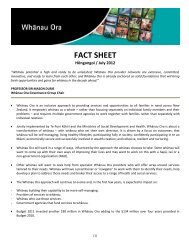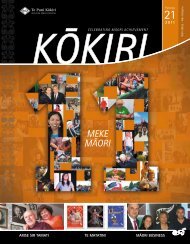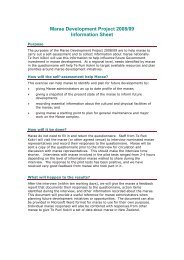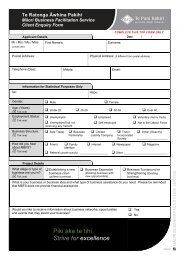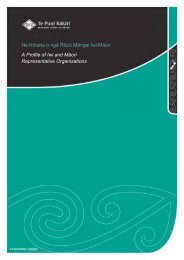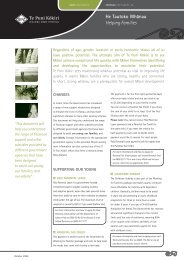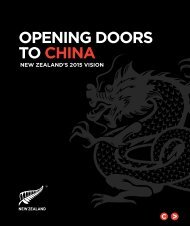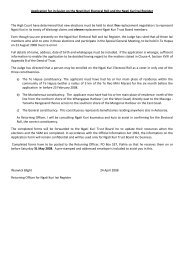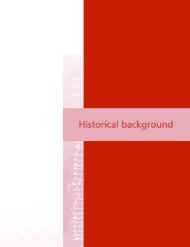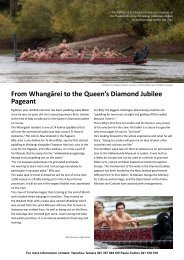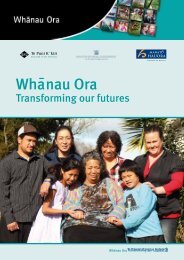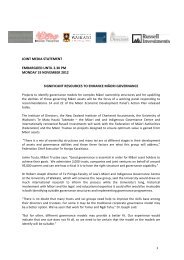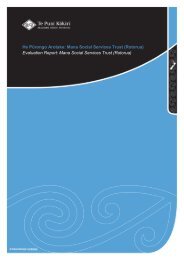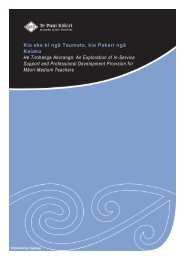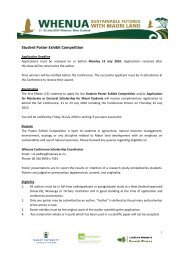Whanau Ora : Report of the Taskforce on Whanau-Centred Initiatives
Whanau Ora : Report of the Taskforce on Whanau-Centred Initiatives
Whanau Ora : Report of the Taskforce on Whanau-Centred Initiatives
You also want an ePaper? Increase the reach of your titles
YUMPU automatically turns print PDFs into web optimized ePapers that Google loves.
4.6.2 While <str<strong>on</strong>g>the</str<strong>on</strong>g> efforts <str<strong>on</strong>g>of</str<strong>on</strong>g> helping agencies were acknowledged and appreciated,<br />
a frequent <str<strong>on</strong>g>the</str<strong>on</strong>g>me at hui was that <str<strong>on</strong>g>the</str<strong>on</strong>g> help had been directed at a crisis and<br />
had not provided whānau with skills, knowledge and encouragement to<br />
build <str<strong>on</strong>g>the</str<strong>on</strong>g>ir own capability so that future crises could be avoided. Typically,<br />
<strong>on</strong>ce <str<strong>on</strong>g>the</str<strong>on</strong>g> immediate crisis was resolved, help was withdrawn. We have<br />
already noted that current c<strong>on</strong>tractual arrangements for providers do<br />
not always allow for extended interventi<strong>on</strong>s that can focus <strong>on</strong> capability<br />
building ra<str<strong>on</strong>g>the</str<strong>on</strong>g>r than crisis resoluti<strong>on</strong>. But, especially where young people are<br />
involved, a developmental approach would seem sensible – recognising that<br />
<str<strong>on</strong>g>the</str<strong>on</strong>g> early years are critical for <str<strong>on</strong>g>the</str<strong>on</strong>g> inculcati<strong>on</strong> <str<strong>on</strong>g>of</str<strong>on</strong>g> adaptive behaviours.<br />
The whānau we have<br />
worked with remain in our<br />
circles forever, knowing<br />
that o<str<strong>on</strong>g>the</str<strong>on</strong>g>rs care, and share<br />
in <str<strong>on</strong>g>the</str<strong>on</strong>g> mahi required to<br />
turn out positive tamariki<br />
who are able to c<strong>on</strong>tribute<br />
back to <str<strong>on</strong>g>the</str<strong>on</strong>g>ir whānau and<br />
communities forever!<br />
4.6.3 By and large, Māori parents want <str<strong>on</strong>g>the</str<strong>on</strong>g> best for <str<strong>on</strong>g>the</str<strong>on</strong>g>ir children but, for <strong>on</strong>e<br />
reas<strong>on</strong> and ano<str<strong>on</strong>g>the</str<strong>on</strong>g>r, do not always have <str<strong>on</strong>g>the</str<strong>on</strong>g> resources to make those hopes<br />
come to fruiti<strong>on</strong>. The <str<strong>on</strong>g>Taskforce</str<strong>on</strong>g> learned that many families do not have active<br />
links with whānau and are <str<strong>on</strong>g>the</str<strong>on</strong>g>refore not able to call <strong>on</strong> whānau members<br />
for support or advice. Some hui participants saw whānau-centred initiatives<br />
as a vehicle for <str<strong>on</strong>g>the</str<strong>on</strong>g> active promoti<strong>on</strong> <str<strong>on</strong>g>of</str<strong>on</strong>g> whānau c<strong>on</strong>nectedness so that<br />
<str<strong>on</strong>g>the</str<strong>on</strong>g>ir collective resources could be applied to parenting, grandparenting<br />
and future planning. Where families are disc<strong>on</strong>nected from whānau, <str<strong>on</strong>g>the</str<strong>on</strong>g><br />
beneficial effects are less likely to be realised. Several hui participants noted<br />
<str<strong>on</strong>g>the</str<strong>on</strong>g> sharp c<strong>on</strong>trast between <str<strong>on</strong>g>the</str<strong>on</strong>g> type <str<strong>on</strong>g>of</str<strong>on</strong>g> whānau experience available to <str<strong>on</strong>g>the</str<strong>on</strong>g><br />
children <str<strong>on</strong>g>of</str<strong>on</strong>g> earlier generati<strong>on</strong>s and <str<strong>on</strong>g>the</str<strong>on</strong>g> current trends where whānau are<br />
geographically separated and children have less opportunity to interact<br />
with a wider circle <str<strong>on</strong>g>of</str<strong>on</strong>g> relatives.<br />
4.6.4 The importance <str<strong>on</strong>g>of</str<strong>on</strong>g> educati<strong>on</strong> to whānau outcomes, and dissatisfacti<strong>on</strong><br />
with current educati<strong>on</strong>al achievement for Māori children, was reiterated at<br />
several hui. A number <str<strong>on</strong>g>of</str<strong>on</strong>g> participants saw Whānau <str<strong>on</strong>g>Ora</str<strong>on</strong>g> as a catalyst for <str<strong>on</strong>g>the</str<strong>on</strong>g><br />
development <str<strong>on</strong>g>of</str<strong>on</strong>g> better relati<strong>on</strong>ships between whānau and schools so that<br />
standards could be raised and young people could gain better prospects<br />
for employment and citizenship. While whānau were widely regarded as<br />
<str<strong>on</strong>g>the</str<strong>on</strong>g> ‘first teachers’ <str<strong>on</strong>g>the</str<strong>on</strong>g>re was clear recogniti<strong>on</strong> <str<strong>on</strong>g>of</str<strong>on</strong>g> <str<strong>on</strong>g>the</str<strong>on</strong>g> role that schools could<br />
play in advancing whānau opportunities. However, <str<strong>on</strong>g>the</str<strong>on</strong>g> fact that so many<br />
Māori boys, in particular, left school without a meaningful qualificati<strong>on</strong><br />
was seen as an indictment <strong>on</strong> society in general and a burden for future<br />
generati<strong>on</strong>s. But it was also seen as a challenge to whānau to make <str<strong>on</strong>g>the</str<strong>on</strong>g>ir<br />
own expectati<strong>on</strong>s <str<strong>on</strong>g>of</str<strong>on</strong>g> <str<strong>on</strong>g>the</str<strong>on</strong>g> educati<strong>on</strong> system more explicit and to c<strong>on</strong>sider <str<strong>on</strong>g>the</str<strong>on</strong>g>ir<br />
own roles in educati<strong>on</strong> and in <str<strong>on</strong>g>the</str<strong>on</strong>g> transmissi<strong>on</strong> <str<strong>on</strong>g>of</str<strong>on</strong>g> knowledge and values.<br />
4.6.5 Because <str<strong>on</strong>g>the</str<strong>on</strong>g>y have intergenerati<strong>on</strong>al reach, whānau can act as<br />
c<strong>on</strong>duits between <str<strong>on</strong>g>the</str<strong>on</strong>g> past and <str<strong>on</strong>g>the</str<strong>on</strong>g> future. The <str<strong>on</strong>g>Taskforce</str<strong>on</strong>g> is swayed by<br />
hui participants’ views that Whānau <str<strong>on</strong>g>Ora</str<strong>on</strong>g> has <str<strong>on</strong>g>the</str<strong>on</strong>g> potential to provide a<br />
sound platform for future generati<strong>on</strong>s, not <strong>on</strong>ly through <str<strong>on</strong>g>the</str<strong>on</strong>g> endeavours<br />
<str<strong>on</strong>g>of</str<strong>on</strong>g> whānau <str<strong>on</strong>g>the</str<strong>on</strong>g>mselves but also through <str<strong>on</strong>g>the</str<strong>on</strong>g> types <str<strong>on</strong>g>of</str<strong>on</strong>g> relati<strong>on</strong>ships that<br />
whānau can c<strong>on</strong>struct with key societal instituti<strong>on</strong>s such as schools. In<br />
building those relati<strong>on</strong>ships <str<strong>on</strong>g>the</str<strong>on</strong>g>re is room for active advocacy by and <strong>on</strong><br />
behalf <str<strong>on</strong>g>of</str<strong>on</strong>g> whānau, and for greater accountabilities to whānau.<br />
36



